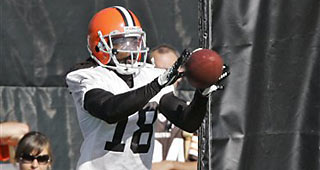NFL Commissioner Roger Goodell notified Donte' Stallworth of the Cleveland Browns on Thursday that he is suspended without pay for the 2009 season for violating both the NFL's policy on substances of abuse and the personal conduct policy.
On June 16, Stallworth pled guilty to DUI/Manslaughter, a second degree felony in Florida, resulting from a March 14 incident in which he struck and killed a pedestrian while driving under the influence of alcohol.
Stallworth will be reinstated after the Super Bowl in February 2010. He may not participate in any team activity during the 2009 season.
Commissioner Goodell had suspended Stallworth indefinitely on June 18. On August 5, the Commissioner conducted a hearing and met in person with Stallworth, his representatives and NFLPA officials. He also met privately with Stallworth on August 10 at the player's request.
Following are excerpts from Commissioner Goodell's letter to Stallworth:
"As you recognized both at and following the hearing, guilt or innocence as a matter of criminal law is not the same as a violation of NFL policies. Here, longstanding league policies make clear that discipline is warranted "if a player is convicted of or admits to a violation of the law?relating to the use of alcohol." The degree of discipline may take into account "aggravating circumstances, including but not limited to felonious conduct or felonious injury or death of third parties?" All of those factors are present here. There is no question that your actions had tragic consequences to an innocent man and his family, and that you have violated both the Substances of Abuse and Personal Conduct Policies. In that respect, you are clearly guilty of conduct detrimental to the integrity of and public confidence in the NFL."
"Nor do I find that the outcome in the Florida courts is controlling in terms of determining disciplinary consequences within the NFL. The considerations that applied in Florida, particularly with respect to criminal standards of proof, claims of contributory negligence, consideration of crowded court dockets, and the like, do not enter into this decision. Without regard to the merits of the disposition of the criminal case, I believe that further consequences are necessary."
Stallworth Suspended For 2009 Season


